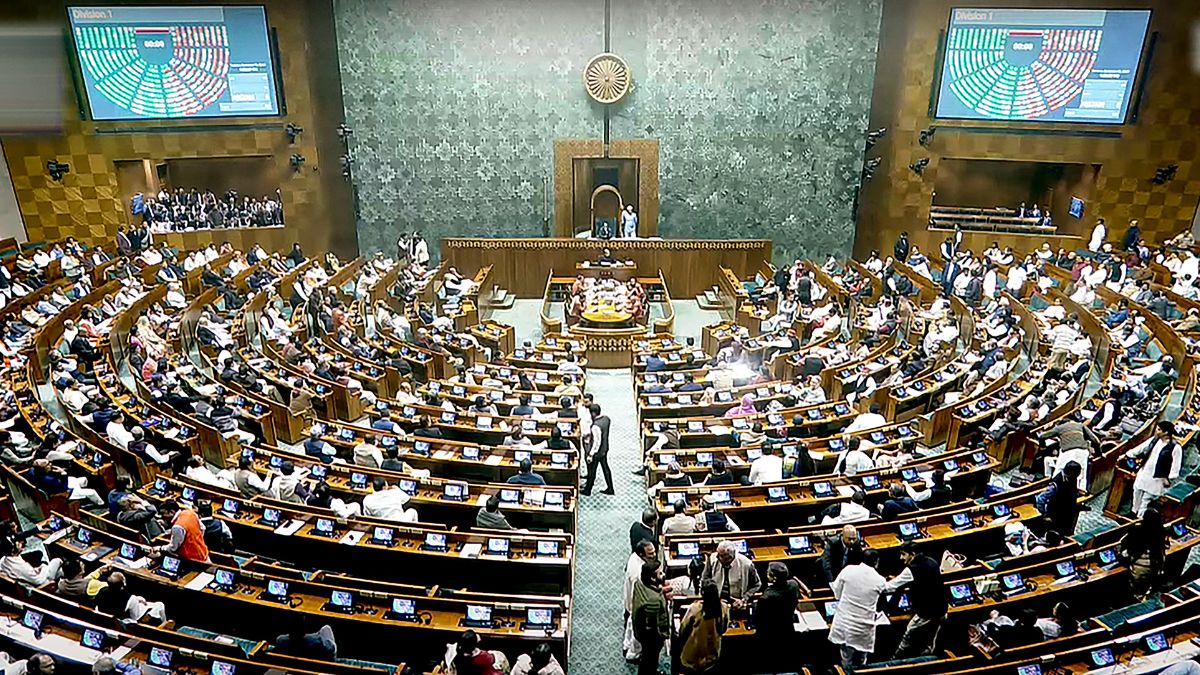The Centre has introduced two bills in the Lok Sabha that will help implement the Bharatiya Janata Party’s (BJP) plank of “One Nation, One Election” (ONOE). Law Minister Arjun Ram Meghwal Tuesday (December 17) tabled the bills – the Constitution (129th Amendment) Bill and the Union Territories Amendment Bill – to sync the general and Assembly elections.
The opposition has objected to the bills, with the INDIA bloc dubbing the move “dictatorial”. The government has defended the proposed legislation, with Meghwal saying that the bills did not attack the “basic structure doctrine, as claimed by the opposition”.
The two bills were introduced after a division voting which saw 269 members in favour of their introduction and 198 opposing. The opposition MPs have hit out at the ruling alliance, saying the government failed to secure a two-thirds majority to introduce the bills in the Lower House.
Let’s take a closer look.
Did govt need 2/3rd majority?
Article 368 empowers the Parliament to amend the Constitution. It states, “An amendment of this Constitution may be initiated only by the introduction of a Bill for the purpose in either House of Parliament, and when the Bill is passed in each House by a majority of the total membership of that House and by a majority of not less than two-thirds of the members of that House present and voting, it shall be presented to the President who shall give his assent to the Bill and thereupon the Constitution shall stand amended in accordance with the terms of the Bill.”
The government did not require a two-thirds majority to introduce a Constitution Amendment Bill in the Parliament. A simple majority of those present and voting in the House allows the introduction of a bill.
Speaking to Indian Express, former Lok Sabha secretary general PDT Achary said the government did not need a special majority to introduce a bill to amend the Constitution.
But to pass a bill to amend the Constitution, the government needs the support of two-thirds of the members present and voting.
Article 368(2) outlines constitutional amendments require a special majority, which is a “majority of the total membership of that House and by a majority of not less than two-thirds of the members of that House present and voting.”
A special majority is not required even while referring such a bill to a Select or Joint Committee.
According to Rule 157 of the Rules of Procedure and Conduct of Business in Lok Sabha, which deals with Constitution Amendment Bills, “If the motion in respect of such Bill is that: (i) the Bill be taken into consideration; or (ii) the Bill as reported by the Select Committee of the House or the Joint Committee of the Houses, as the case may be, be taken into consideration; or (iii) the Bill, or the Bill as amended, as the case may be, be passed; then the motion shall be deemed to have been carried if it is passed by a majority of the total membership of the House and by a majority of not less than two-thirds of the members present and voting.”
ALSO READ: One Nation, One Election: How feasible is the idea?
How numbers stack up
The government will require 362 votes or the support of two-thirds of the members of the Lok Sabha if the House is at full strength of 543.
After the Lok Sabha elections earlier this year, the National Democratic Alliance (NDA) led by the BJP has 293 MPs in the Lower House. The Congress-led INDIA bloc has 232 members in the Lok Sabha.
The NDA is currently short of 69 more votes in favour of the legislation to get it passed in the Lok Sabha. This means it will have to depend on non-NDA parties for the passage of ONOE bills.
The Rajya Sabha has a total of 231 MPs currently and a two-thirds majority for the bills to clear is 154.
In the Upper House, the NDA has 113 MPs. With the support of six nominated MPs and two Independents, the ruling alliance’s tally will rise to 121.
The INDIA bloc has 85 MPs and could get the support of Independent MP Kapil Sibal.
The non-aligned parties, including the YSR Congress Party, the Biju Janata Dal, and Bharat Rashtra Samithi (BRS), have 19 MPs, as per Indian Express.
The AIADMK has four MPs in the Rajya Sabha and the Bahujan Samaj Party (BSP) has one. Mayawati has come out in favour of the bill to hold simultaneous elections at the national and state levels in the country.
Again, the NDA will have to convince other parties to back the bills for them to be passed in the Rajya Sabha.
If the ONOE bills are passed by the Parliament, they will be referred to the President. The Bills will become an Act once the President gives her assent.
With inputs from agencies
)